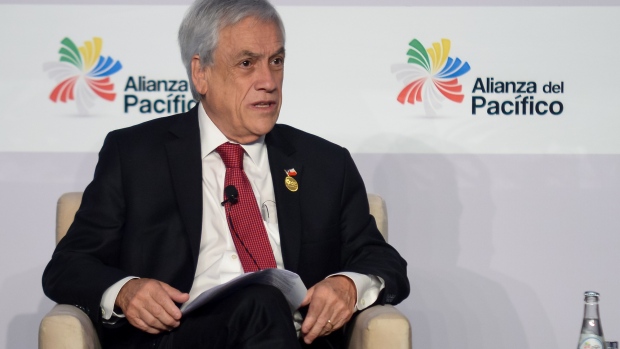Aug 20, 2019
Two Communist Lawmakers Are Suddenly Setting the Agenda in Chile
, Bloomberg News

(Bloomberg) -- In a country that’s long stood out as the beacon of free-market principles in Latin America, two young communist women are capturing much of the attention in government circles.
A labor-reform bill introduced by Chile’s Camila Vallejo and Karol Cariola, who made a name for themselves as student-movement leaders eight years ago, is gaining widespread support -- and putting the two Communist Party lawmakers in the crosshairs of right-leaning President Sebastian Pinera.
At issue is a plan to cut the country’s maximum work week to 40 hours from 45. Pinera has called the bill unconstitutional, vowing to fight it in court if it wins approval. He has his own proposal that’s struggling to move forward.
For Pinera, a 69-year-old billionaire in his second stint as president, the labor squabble and congressional gridlock are far from what was envisioned near the midpoint of his term. He was elected in late 2017 under the promise of bringing in major reforms that would usher in an economic boom. Now, growth is expected to cool as key tax and pension bills are also stalled, just as the U.S.-China trade war is hitting prices for copper, the country’s top export.
“The government should be setting the agenda and using its political capital,” Macarena Lobos, who served as deputy finance minister for Pinera’s predecessor, Michelle Bachelet, said in an interview at radio Pauta Bloomberg. “Instead, it’s being pushed aside in its key reforms.”
The economy has already showed signs of weakness, with the central bank cutting its growth estimates for 2019 to 2.8% from 3.6% at the beginning of the year. The country’s benchmark IPSA stock index is down about 6% this year, while the MSCI EM Latin America Index is little changed.
Student Protests
In Chile, the president has powers to decide what’s discussed at the legislative level, making the rise of the communist duo’s bill all the more surprising.
Vallejo, 31, and Cariola, 32, could be considered early versions of Alexandria Ocasio-Cortez, the New York congresswoman who’s become a leftist star in America. Vallejo gained notoriety during Pinera’s first tenure by leading student demonstrations over Chile’s education system. Hundreds of thousands of people joined the protests, fueled by discontent over inequality.
Pinera’s response included a cabinet shuffle and a new education fund, but Chilean students were unsatisfied. His approval ratings sank while Vallejo became a rising star of the Communist Party, backed by popular support. Polls in 2011 showed she was even more admired than Bachelet or famous revolutionary songstress Violeta Parra.
Cariola, also a young activist of the Communist Party, joined the ranks of the student leaders and traveled around the globe with Vallejo as a representative of the movement. They became congressional deputies in 2014, turning into powerful politicians on the left, and Pinera’s adversaries.
Like Ocasio-Cortez, Vallejo “is a young person in the opposition who is an incisive critic of the government and is skilled at placing issues on the congressional agenda,” said Kenneth Bunker, a Chilean political scientist.
The Vallejo-Cariola bill aims to cut down the labor load for a country that ranks sixth for hours worked among members of the Organization for Economic Cooperation and Development. The lawmakers, aiming to increase productivity and bolster quality of life, have cited how European countries like France have implemented similar measures with positive results.
The bill has been approved by the Lower House and garnered 74% popular support in a respected Chilean poll. It will then have to go through “particular discussions” before it can move on to the Senate.
‘Extreme Urgency’
Pinera -- whose approval rating is about 34%, according to Cadem -- has pitched a labor reform bill that would give more flexible contracts and lower work hours to 180 hours a month, or an average of 41 per week. It was lingering in the Senate when his labor minister announced Aug. 8 that it would be given “extreme urgency,” which gives deadlines for Congress to vote on it.
Business associations have rallied against the Vallejo-Cariola bill, saying it would hurt productivity and increase labor costs for local companies by as much as 12%.
“Chileans want to work like the French and grow like the Asians. It doesn’t work like that. It’s one or the other,” Ricardo Caballero, an MIT economist, said in an interview with La Tercera about the bill.
One way for the president’s government to advance on his agenda would be for the government to back parts of the communist-backed bill and add to its own labor flexibility plan as a trade to secure votes for Pinera’s other key issues, such as a tax overhaul, according to Patricio Navia, a political science professor at New York University.
“But Pinera would likely see that as bowing to the communist party,” Navia said. “It’s a concession that he wouldn’t be willing to do.”
That stubbornness in an opposition-controlled Congress could have a political impact as well as an economic one, with next year’s regional and municipal elections potentially swaying based on how Chileans respond to the policy, Bunker said.
“A perfect storm is approaching that could affect the government’s approval rating,” he said. “In adverse weather, the government needs to change something, and that could be by negotiating with the opposition.”
To contact the reporters on this story: Eduardo Thomson in Santiago at ethomson1@bloomberg.net;Daniela Guzman in Santiago at dguzman26@bloomberg.net
To contact the editors responsible for this story: Walter Brandimarte at wbrandimarte@bloomberg.net, ;Daniel Cancel at dcancel@bloomberg.net, Kara Wetzel
©2019 Bloomberg L.P.


